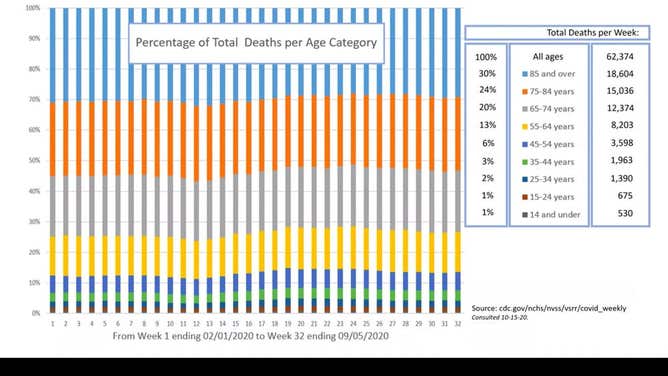Johns Hopkins Publishes Study Saying COVID-19 Deaths Overblown, Then Deletes It
Johns Hopkins University published a study that COVID-19 isn't nearly as bad as it seems.
Then deleted it.
This strange decision was reported by NotTheBee.com, which used Internet archive Wayback Machine to reveal the Johns Hopkins' study in its entirety. The study was released Sunday.
You can check a sample of it in the chart below. Or just read the whole thing here.

Per NotTheBee.com:
Genevieve Briand, assistant program director of the Applied Economics master's degree program at Hopkins, critically analyzed the effect of COVID-19 on U.S. deaths using data from the Centers for Disease Control and Prevention (CDC) in her webinar titled "COVID-19 Deaths: A Look at U.S. Data."
Brand stated what many to believe is the obvious regarding the older population dying from COVID-related causes considerably more than the younger generation.
"The reason we have a higher number of reported COVID-19 deaths among older individuals than younger individuals is simply because every day in the U.S. older individuals die in higher numbers than younger individuals,” Briand wrote.
She gave multiple more examples of how COVID deaths among the elderly aren't any different than elderly deaths in recent years from any other cause.
Then Briand dropped the following bombshell.
“The reason we have a higher number of reported COVID-19 deaths among older individuals than younger individuals is simply because every day in the U.S. older individuals die in higher numbers than younger individuals,” Briand said.
Why Johns Hopkins decided to delete this information is anyone's guess. And knowing how all of this has been reported on since it made its way to the U.S. last winter, nobody will likely ask, either.
It may or may not be accurate, but it sure seems like way too many people would rather keep a bad thing going than get to the bottom of how COVID is truly impacting America.
With that in mind, the idea that Johns Hopkins may have been pressured into deleting its findings may not be so far-fetched.